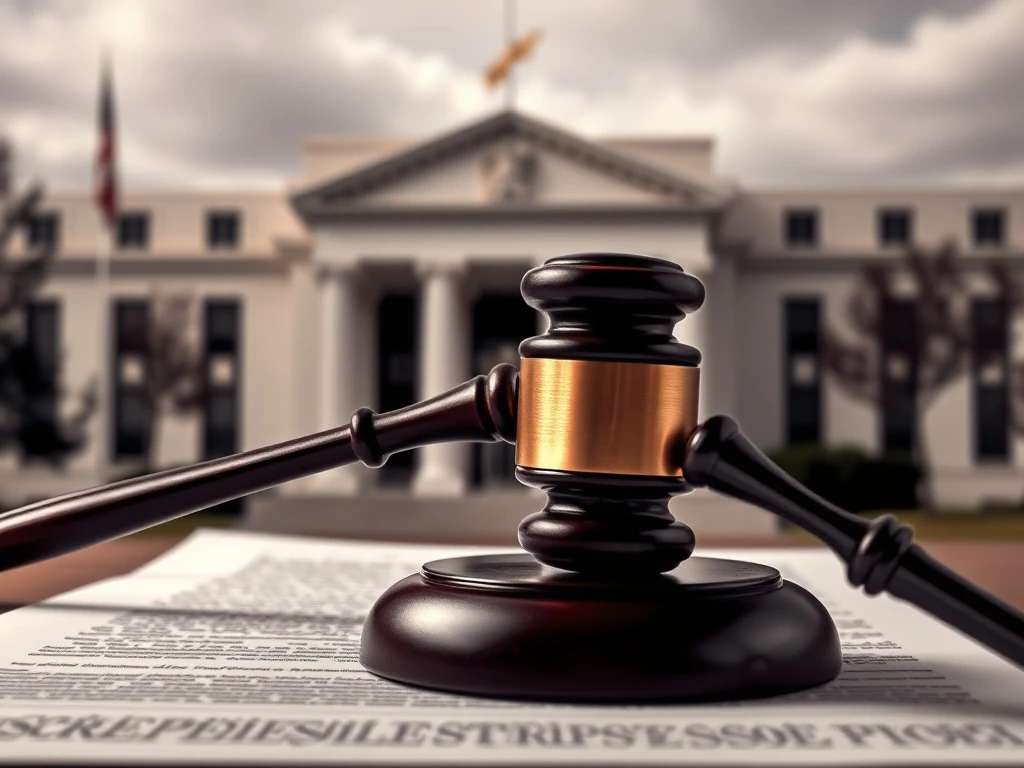Trump-Linked Firm Unleashes Groundbreaking Lawsuit: Demands Public FOMC Meeting

In a move that has sent ripples through financial markets and political circles, a U.S. investment firm with strong ties to Donald Trump has initiated a bold legal challenge against the Federal Reserve. This isn’t just another lawsuit; it’s a direct demand for the central bank to open its most crucial discussions to the public. For anyone watching the interplay between politics, economics, and even the cryptocurrency landscape, this **Trump Fed lawsuit** represents a pivotal moment, potentially reshaping the very nature of monetary policy and transparency.
Why is a Trump-Linked Firm Demanding the FOMC Meeting Public?
Azoria Capital, an investment firm managed by James Fishback, has taken aim at Federal Reserve Chairman Jerome Powell and other central bank officials. Their core demand is straightforward yet revolutionary: compel the Federal Open Market Committee (FOMC) to hold its upcoming July 29–30 monetary policy meeting in public. Azoria Capital argues that the Fed’s long-standing practice of conducting closed-door discussions fundamentally violates federal transparency laws.
Breach of Transparency: The lawsuit alleges that the secrecy surrounding FOMC meetings undermines accountability.
Risk of Politicization: Azoria claims that closed-door decisions risk politicizing economic choices, leading to outcomes that may not serve the public interest.
Undermining Economic Agenda: A key assertion is that the Fed’s decision to maintain high interest rates, despite former President Trump’s repeated calls for cuts, has been orchestrated to undermine his economic vision and harm the American people.
This legal action aligns with broader criticisms from Trump, who has consistently pressured **Jerome Powell** to lower rates and accused the Fed of prioritizing its independence over the executive branch’s economic goals. The firm seeks a court order to force the Fed to make the meeting accessible, setting the stage for a significant legal and political showdown.
The Stakes of Federal Reserve Transparency
The lawsuit introduces unprecedented scrutiny into the Fed’s operational independence. Central banks worldwide typically operate with a degree of autonomy to shield monetary policy from short-term political interference. However, Azoria Capital’s lawsuit challenges the very rationale for this secrecy, framing it as a breach of public trust.
Historical Precedent: Legal experts note that courts have historically upheld the Fed’s discretion in monetary policy. This case, however, could set a new precedent if it advances significantly.
Accountability vs. Autonomy: The debate centers on how the Fed balances its mandate to manage inflation and employment with the need for public accountability, especially when its decisions have such widespread impact.
Market Impact: Increased transparency could lead to greater market predictability or, conversely, increased volatility if political pressures are seen to directly influence decisions.
The **Federal Reserve transparency** debate is not new, but this lawsuit brings it to the forefront with a unique political angle. Critics argue that opacity allows for potential overreach, while the Fed maintains its decisions are data-driven and apolitical.
Navigating Monetary Policy and Political Influence
The core of this dispute lies in the tension between executive influence and institutional independence. Trump’s campaign against **Jerome Powell** has intensified recently, with the former president threatening to remove him and criticizing the Fed’s 4.3% short-term interest rate policy as detrimental to economic growth. His recent visit to the Federal Reserve was interpreted as a symbolic escalation of these pressures, even though Trump has stated he has no immediate plans to dismiss Powell before his term ends.
The lawsuit positions the Fed’s secrecy as a vulnerability to political interference, framing the case as a test of transparency norms. However, significant legal hurdles loom. Courts have traditionally deferred to the Fed’s operational autonomy, recognizing its crucial role in stabilizing the economy. If the case advances, it may compel the central bank to justify its closed-door practices under national security or functional necessity arguments.
The outcome of this case could profoundly influence how the Fed balances transparency with its mandate to manage inflation and employment without direct political input. For now, the central bank’s independence in setting **monetary policy** remains a fiercely contested issue, with this legal challenge highlighting the broader debate over governance and accountability in economic policymaking.
The July FOMC Meeting Public: A Pivotal Moment?
The upcoming July 29–30 meeting remains a focal point of this legal and political dispute. Should Azoria Capital succeed, even partially, in its demands, it would fundamentally alter how the Fed operates and how the public perceives its decisions. While the immediate impact on interest rates or the broader economy is uncertain, the long-term implications for the institution’s credibility and public trust are substantial.
This **Trump Fed lawsuit** is more than just a legal battle; it’s a proxy war over who controls the narrative and the direction of the U.S. economy. As the case unfolds, all eyes will be on the courts and the Federal Reserve, watching how this unprecedented challenge to its traditional operations plays out.
The implications for financial markets, including the volatile cryptocurrency space, are significant. Greater transparency could lead to more informed decisions by investors, but it could also expose the Fed to even greater political pressure, potentially leading to less predictable outcomes. The debate over the Fed’s independence and transparency is far from over, and this lawsuit ensures it will remain a central topic of discussion.
Frequently Asked Questions (FAQs)
Q1: What is Azoria Capital’s main demand in the lawsuit against the Fed?
Azoria Capital is demanding that the Federal Open Market Committee (FOMC) hold its July 29–30 monetary policy meeting in public, arguing that the Fed’s current closed-door practice violates federal transparency laws and undermines accountability.
Q2: How does this lawsuit relate to Donald Trump?
Azoria Capital is led by Donald Trump allies, and the lawsuit explicitly states that the Fed’s actions “harm President Trump and his economic vision.” This aligns with Trump’s past criticisms of the Fed’s interest rate policies and his calls for rate cuts.
Q3: What are the main arguments for and against the Fed’s closed-door meetings?
Arguments for secrecy typically center on maintaining the Fed’s independence from political interference, allowing for frank discussion, and preventing market manipulation based on real-time disclosures. Arguments against secrecy, as made by Azoria Capital, focus on transparency, accountability, and the potential for politicization when decisions are made behind closed doors.
Q4: Has a court ever compelled the Fed to open its meetings before?
Historically, courts have largely upheld the Federal Reserve’s discretion in its monetary policy operations and meeting procedures. This lawsuit, if it proceeds, could set a new legal precedent regarding the extent of the Fed’s operational autonomy and transparency requirements.
Q5: What could be the impact of this lawsuit on financial markets?
If the lawsuit succeeds, it could lead to unprecedented transparency in Fed decision-making, potentially increasing market predictability or, conversely, introducing new volatility due to increased political scrutiny. For cryptocurrency markets, greater clarity or uncertainty around U.S. monetary policy could have significant ripple effects.
Q6: Who is Jerome Powell and why is he a target in this lawsuit?
Jerome Powell is the current Chairman of the Federal Reserve. He is named in the lawsuit because he leads the central bank and the FOMC, which sets monetary policy. He has been a frequent target of criticism from Donald Trump regarding interest rate decisions.









